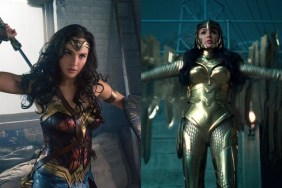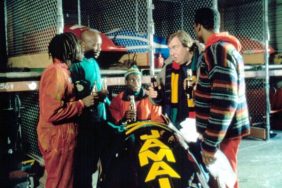I’m not sure why audiences decided to sh*t on Andrew Stanton’s John Carter. Sometimes we just screw up, I suppose. The list of great films that bombed when they first came out is longer than my arm. For whatever reason Fight Club, It’s a Wonderful Life, Office Space, Citizen Kane and Willy Wonka and the Chocolate Factory (just to name a few) all failed to find an audience on their first go around, but we found our way to them eventually. Time is the greatest critic of all. And I suspect that time will be kind to John Carter once people finally watch the film without a cruddy marketing campaign to sway them. It’s on Blu-ray today, so if you missed it in theaters – and statistically speaking, you probably did – you finally have a chance to make things right.
I reviewed the film back in March, and I freaking loved it. Having watched it again on home video, in glorious 2D, I can say that I still love it but have a greater awareness of its flaws. John Carter suffers from the same problems most space operas have, like overly arch characters and a tendency to wallow in the spectacular crapulence (or “spectaculence”) of its special effects. But like the very best space operas it also brims with an imagination that jolts you to an upright sitting position at all the right times. It boasts an emotional storyline buoyed by childlike wonder and mature ethical dilemmas. While not infallible, calling it the best film of its ilk in many years is not hyperbole.

Starring Taylor Kitsch, whose career is in trouble now that both this and Battleship failed to make it big, John Carter takes its eponymous hero from the wilds of the 19th century American west to the wilds of Barsoom, or as we call it on Earth, Mars. They have a funny name for our planet too. Through a process Carter doesn’t entirely understand, teleporting to Mars has given him superhuman strength and the ability to leap mountains in a single bound. He arrives as the planet is in the middle of its own Civil War, in which the good guys are at war with a despot (“The Wire’s” Dominic West) who has a mysterious and all-powerful new weapon.
Naturally, the good guys want John Carter to be their secret weapon, but years of brutal conflict in the Civil War and the loss of his wife and child have left our hero embittered, and at war with war itself. Through the love of a strong and independent heroine played by Kitsch’s X-Men Origins: Wolverine co-star Lynn Collins, he eventually starts to come around, but not before releasing his pent up rage on whole armies of alien monsters. It’s a simple plot (obviously) but one based on strong internal and external turmoil, fabulously told via beautiful visual effects and a truly magnificent score by Michael Giacchino.

But all is not well in the world of John Carter. Sci-fi and fantasy purists can overlook a slow second act and the desolate Martian landscapes that sometimes fail to make the film seem properly alive. The action sequences range from instantly iconic to confusingly slapdash, particularly during a poor opening sequence and a climactic battle that finds the whole cast flailing swords around like the President of Mars declared it “Nerf Day.” The sincere dialogue also feels a little antiquated at times, but I think you’ll find that it suits John Carter’s period aesthetic and its early-20th century pulp fiction origins. These concerns are mostly nitpicks in the long run. I can name you a dozen recent, infinitely more popular films with worse crimes on their resume, from the schizophrenic Transfomers pictures to the simple-minded plot hole-ridden Avatar. And while still failing to reach perfection, John Carter laps them all through a potent mixture of awe and heart.
John Carter gets the Blu-ray it deserves this week with a sumptuous transfer and a spectacular surround sound treatment. The special features are mostly successful at pulling you into the film’s sense of the fantastic, showing the nearly 100-year process of adapting John Carter to the screen and smartly addressing various aspects of the production via a lively commentary track with director Andrew Stanton and producers Jim Morris and Lindsey Collins. The deleted scenes are hardly a revelation, but are worth watching if only to see their various states of completion, since they were abandoned at several different points throughout the production process.

The blooper reel is, as always, of little interest (although there’s a highlight at the end), and alas, the featurette “360 Degrees of John Carter” wears out its welcome quickly. The short doc follows the shooting of John Carter over a single day, and if you’ve ever worked on a film set, you know how boring that can be. I see what they were getting at – showing a small part of the production in detail rather than the whole thing in broad strokes – but I think they picked the wrong day. There’s so much involved in the action sequence they chose to document that it feels like they’re covering the broad strokes anyway. And maybe they shouldn’t have kept cutting to a digital clock that beeps so annoyingly I eventually turned the special feature off before it was done.
John Carter belongs in your film collection. If you were scared off by all the peer pressure and underwhelming trailers you’ll be pleasantly surprised. If you saw the film and noticed only its flaws, I implore you: take another look and try to get in on its pulpy wavelength. It’s a rewarding, often breathtaking motion picture experience. Don’t sh*t on it.









